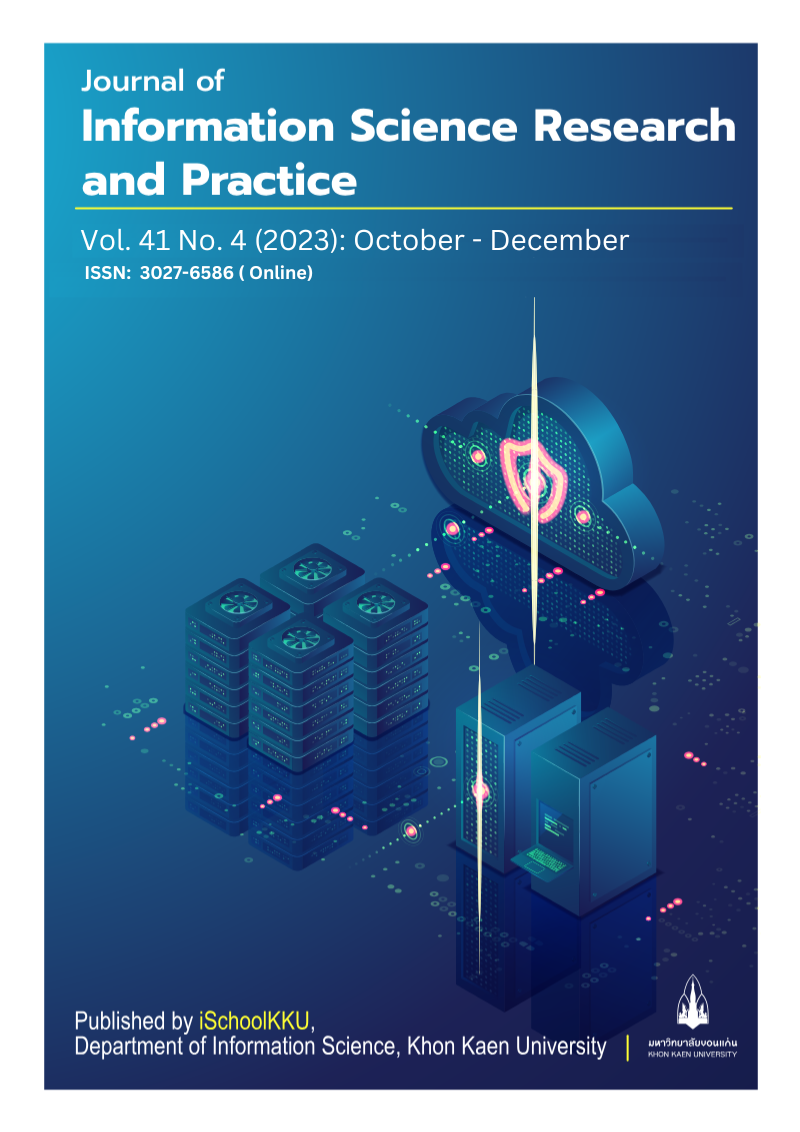Sentiment Analysis of New Normal Tourism Data in Chiang Mai Province After the COVID-19 Pandemic
DOI:
https://doi.org/10.14456/jiskku.2023.29Keywords:
Service user reviews, Sentiment analysis, Tourist Service, COVID-19Abstract
Purpose: The objectives of this research aim to conduct a comprehensive analysis of the sentiment analysis of tourists who use services in Chiang Mai province. The analysis will be conducted including three types: neutral, positive, and negative. The results of the analysis will be presented in the form of a data visualization.
Methodology: The technique used in this research is Logistic Regression analysis. This involves breaking long texts into words (Word Tokenization) and then analyzing reviewing comments by comparing them with a text corpus from Wisesight Sentiment (https://pythainlp.github.io). The corpus contains 24,075 comments that have been collected in a dataset and classified with labels naming the sentiment of each comment. These labels are used to train the Logistic Regression model to identify sentiment in new data. The trained model was then tested and applied to the collected data to classify sentiment levels. This was done using a Python program to create a model for analyzing three types of sentiment statements: neutral, positive, and negative. Finally, the dataset of 1,900 comments collected from the website was taken to test with the model, and classified by sentiment, and shown as a data visualization.
Findings: Researchers collected 1,900 reviews of tourist destinations and service providers in Chiang Mai from the websites TripAdvisor.com and Wongnai.com. They then used these reviews to test a sentiment analysis model. The model was able to identify three levels of sentiment: neutral, positive, and negative. The results of the analysis were presented in a data visualization format to help businesses improve their services in the future.
Applications of this study: Development of a natural language processing (NLP) analysis model based on opinions and feedback from service users to analyze the advantages, disadvantages, areas for improvement, and opportunities to address challenges. With a large and growing amount of data, it is necessary to have a step-by-step process for analyzing the sentiment of reviews and comments using machine learning techniques.
Downloads
References
Banluesapy, S., & Jirapanthong, W. (2022). Towards Machine Learning Algorithm for Screening Prediction of COVID-19 Patients. Journal of Information Science and Technology, 12(1), 47-60.
Bowornlertsutee, P., & Paireekreng, W. (2022). The Model of Sentiment Analysis for Classifying the Online Shopping Reviews. Journal of Engineering and Digital Technology (JEDT), 10(1), 71-79.
Chodchuang, S., Teeratansirikool, L., Wasuthep, Y., Boonchan, N., & Kopraphatphong, T., (2022). Strategies for Community Tourism Image Building. Journal of Liberal Arts and Service Industry, 5(1), 80-95.
Daolomchan, P., Prapinpongsakorn, S., & Techataweewan, W. (2021). Information-Seeking Behaviors of Thai Generation Y Travelers. Journal of Information Science, 39(1), 38-58.
Economics Tourism and Sports Division (2016). Project on the direction of tourism development in Thailand in the next 10 years. Final Report. Ministry of Tourism and Sports (In Thai). Retrieved from https://secretary.mots.go.th/ewtadmin/ewt/policy/article_attach/ 02FinalReportDirection10Year.pdf
Laowsungsuk, P., Jinda, A., & Sitthisarn, S. (2017). Sentiment analysis of restaurant reviews on review web sites, (In Thai). Thaksin Univ. J, 20(1), 39-47.
Meeprasert, W., & Rattagan, E. (2021). Voice of Customer Analysis on Twitter for Shopee Thailand. Journal of Information Systems in Business (JISB), 7(3), 6-18.
Natale, M. T., & Piccininno, M. (2015). Digital Cultural Heritage and Tourism Recommendations for Cultural Institutions. Uncommon Culture, 6(2), 52–64.
Phurala, A. (2011). Analysis of attitudes for hotel services from Thai and English reviews. (In Thai). Master of Science Thesis. Bangkok: King Mongkut's University of Technology North Bangkok.
Pravatborisut, O. (2021). Python for data science data visualization and machine learning. (In Thai) Bangkok: Provision.
Sappamit, S., & Sunthonsanee, S. (2020). Tourism Behavior of Tourists in Chiang Mai. In The 15th RSU National Graduate Research Conference. (pp 415-423). Bangkok: Graduate Rangsit University.
Suriyawongkul, A., Chuangsuwanich, E., Chormai, P., & Polpanumas, C. (2019). PyThaiNLP/wisesight-sentiment: First release (v1.0) [Computer software]. Zenodo. https://doi.org/10.5281/zenodo. 3457447
Wijannarong, J. (2021). TOURISM MANAGEMENT IN THAILAND FOR THE NEW NORMAL ERA. Journal of MCU Social Science Review 10(4), 372-381.
Wanakitpaiboon, N. (2021). Is Thai tourism still okay in 2019? How should Thai businesses adapt?. Retrieved from https://youtu.be/sTzVlA6ImMU.
Yamane, T. (1967). Statistics, An Introductory Analysis, 2nd. Ed., New York: Harper and Row.








